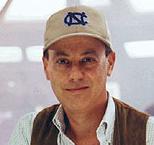Executive producer (EP) is one of the top positions in the production of media. Depending on the medium, the executive producer may be concerned with management accounting or associated with legal issues. In films, the executive producer generally contributes to the film's budget and their involvement depends on the project, with some simply securing funds and others being involved in the filmmaking process.

David Mirkin is an American feature film and television director, writer and producer. Mirkin grew up in Philadelphia and intended to become an electrical engineer, but abandoned this career path in favor of studying film at Loyola Marymount University. After graduating, he became a stand-up comedian, and then moved into television writing. He wrote for the sitcoms Three's Company, It's Garry Shandling's Show and The Larry Sanders Show and served as showrunner on the series Newhart. After an unsuccessful attempt to remake the British series The Young Ones, Mirkin created Get a Life in 1990. The series starred comedian Chris Elliott and ran for two seasons, despite a lack of support from many Fox network executives, who disliked the show's dark and surreal humor. He moved on to create the sketch show The Edge starring his then-partner, actress Julie Brown.
A film producer is a person who oversees film production. Either employed by a production company or working independently, producers plan and coordinate various aspects of film production, such as selecting the script, coordinating writing, directing, editing, and arranging financing.
A showrunner is the top-level executive producer of a television series. The position outranks other creative and management personnel, including episode directors, in contrast to feature films, in which the director has creative control over the production, and the executive producer's role is limited to investing. In scripted comedy and drama TV shows, the showrunner also usually serves as the head writer. The role of a showrunner is not present on all television series, especially outside the US; this article describes the nature of the role where it is present.

Josh Weinstein is an American television writer and producer, known for his work on the animated comedy series The Simpsons. Weinstein and Bill Oakley became best friends and writing partners at St. Albans School; Weinstein then attended Stanford University and was editor-in-chief of the Stanford Chaparral. He worked on several short-term media projects, including writing for the variety show Sunday Best, but was then unemployed for a long period.

Alfred Ernest Jean III is an American screenwriter and producer. Jean is well known for his work on The Simpsons. He was raised near Detroit, Michigan, and graduated from Harvard University in 1981. Jean began his writing career in the 1980s with fellow Harvard alum Mike Reiss. Together, they worked as writers and producers on television shows such as The Tonight Show Starring Johnny Carson, ALF and It's Garry Shandling's Show.
A script editor is a member of the production team of scripted television and radio programmes, usually dramas and comedies. The script editor has many responsibilities including finding new script writers, developing storyline and series ideas with writers, and ensuring that scripts are suitable for production. The script editor will work closely with the writer at each draft of the script, giving the writer feedback on the quality of the work, suggesting improvements that can be made whilst also ensuring that practical issues like show continuity and correct running time are adhered to. Unlike the writers, script editors will usually be full-time members of the production team, working closely with the producer, if the script writer is not a producer.

William Lloyd Oakley is an American television writer and producer, known for his work on the animated comedy series The Simpsons. Oakley and Josh Weinstein became best friends and writing partners at St. Albans School; Oakley then attended Harvard University and was Vice President of the Harvard Lampoon. He worked on several short-term media projects, including writing for the variety show Sunday Best, but was then unemployed for a long period.
Television crew positions are derived from those of film crew, but with several differences.

Shawn Ryan is an American screenwriter and television producer. He has created and/or produced a number of television series including The Shield (2002–2008), The Unit (2006–2009), Lie to Me (2009–11), Timeless (2016–2018), S.W.A.T. (2017–present) and The Night Agent (2023–present).

Michael Piller was an American television scriptwriter and producer, who was best known for his contributions to the Star Trek franchise.
A head writer is a person who oversees the team of writers on a television or radio series. The title is common in the soap opera genre, as well as with sketch comedies and talk shows that feature monologues and comedy skits. In fictional comedy or drama TV shows, this is generally performed by an executive producer, who is usually also the showrunner.
Chris Collins is an American television writer and producer. He has worked on the HBO dramas The Sopranos and The Wire. He was an executive story editor for the Starz drama series Crash. He is a producer and writer for the FX series Sons of Anarchy.

Neal Baer is an American pediatrician and television writer and producer. He is best known for his work on the television shows Designated Survivor, ER and Law & Order: Special Victims Unit.
Kevin Buford Biegel is a television writer/producer, the co-creator of Cougar Town and creator of Enlisted. In April 2017, it was announced that Biegel would serve as showrunner for the live-action New Warriors television series, which would be based on the Marvel Comics superhero team with the same name. The show was not picked up, however, after production languished for over a year.
A line producer is a type of film or television producer who is the head of the production office management personnel during daily operations of a feature film, advertisement film, television film, or TV program. They are responsible for human resources and handling any problems that come up during production. Line producers also manage scheduling and the budget of a motion picture, as well as day-to-day physical aspects of the film production.
Meghan McCarthy is an American screenwriter, lyricist, film and television producer, and creative executive best known as the showrunner of the animated television show My Little Pony: Friendship Is Magic. She is also known for her work on Class of 3000 and Fish Hooks. Since June 2015, she has been the Head of Storytelling for the entire My Little Pony and Littlest Pet Shop brands, helping to "create expansive worlds and characters".

John Roland Clifford Yorke is a British television producer and script editor, who was head of Channel 4 Drama 2003–2005, controller of BBC drama production 2006–2012 and MD of Company Pictures (2013–2015).

A writers' room is a space where writers, usually of a television series, gather to write and refine scripts. It is a common method of writing television series in the US, but is much less widespread in countries like the UK.








